Introduction
Marketing in healthcare has become more crucial than ever. With the global healthcare market expected to reach $665.37 billion by 2028 (Grand View Research, 2021), effective healthcare marketing strategies are essential for providers to stand out.
Marketing for healthcare isn't just about attracting patients; it's about building trust, educating communities, and improving overall health outcomes.
One emerging trend in healthcare marketing is the use of chatbots. Healthcare chatbots are revolutionizing patient engagement, with the market projected to grow at a CAGR of 21.56% from 2022 to 2030 (Data Bridge Market Research, 2023). These chatbots for healthcare provide 24/7 support, answer queries, and even assist in appointment scheduling.
As we delve into this ultimate guide, we'll explore how healthcare marketing is evolving, from traditional methods to innovative digital strategies. Whether you're an experienced marketer or new to the healthcare industry, this guide will equip you with the knowledge to excel in the dynamic world of healthcare marketing.
What is Healthcare Marketing?
Healthcare marketing is all about promoting healthcare services and products to reach more patients and clients. Marketing in healthcare is essential for healthcare organizations to attract new patients, retain existing ones, and build trust in the community.
Examples of Healthcare Marketing:By effectively promoting their services, healthcare providers can communicate their expertise and care to a wider audience.
Online Presence: Many healthcare organizations use websites, social media, and online ads to reach patients. For example, a hospital may create a user-friendly website that provides information about their services, doctors, and facilities.
Educational Campaigns: Healthcare providers often run campaigns to educate the public about health issues. For instance, a clinic might host a workshop on diabetes management to raise awareness and offer support to patients.
Community Events: Hospitals and clinics frequently participate in community events to engage with local residents. For example, a healthcare organization may sponsor a health fair or offer free health screenings to promote preventive care.
Patient Testimonials: Sharing patient stories and testimonials can be a powerful way to showcase the quality of care provided by a healthcare organization. By featuring real-life experiences, hospitals and clinics can build trust with potential patients.
Healthcare Chatbots: Some healthcare providers use chatbots in healthcare to improve patient communication and support. These AI-powered tools can answer questions, schedule appointments, and provide patients with quick access to information.
Benefits of Healthcare Marketing
Implementing a robust healthcare marketing strategy can bring various advantages that help your healthcare organization flourish.
Increased Awareness
One significant benefit of healthcare marketing is that it helps to spread the word about your services. By promoting your healthcare products and services effectively, you can reach a broader audience and make more people aware of what you have to offer.
This increased awareness can lead to more patients choosing your organization for their healthcare needs.
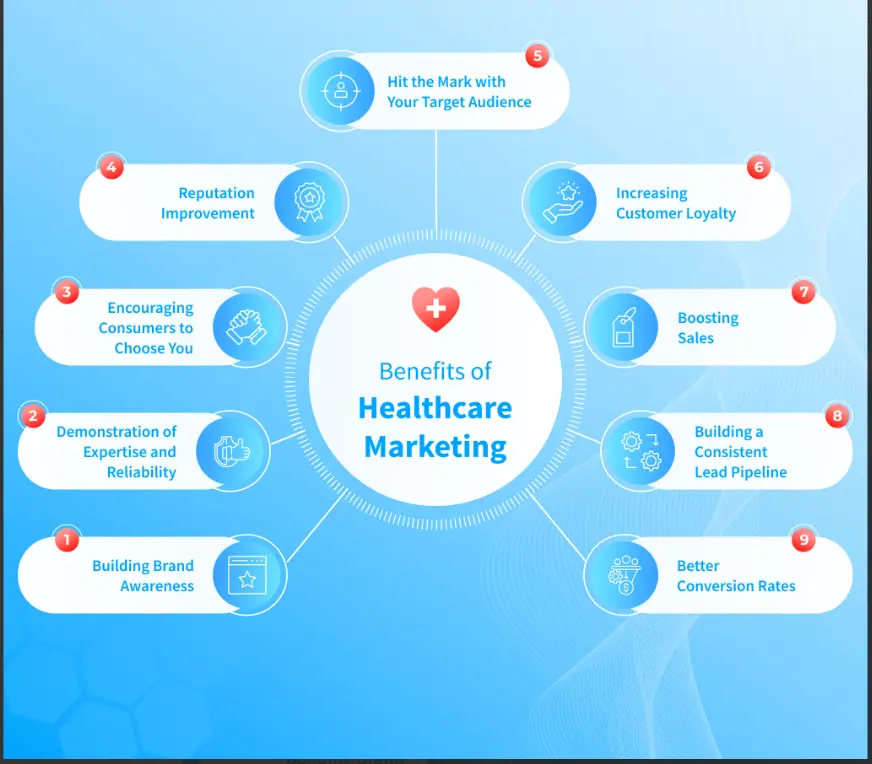
Better Patient Engagement
Effective healthcare marketing can also enhance patient engagement. When patients feel connected and engaged with your healthcare organization, they are more likely to trust your services and follow through on treatment plans.
By using engaging and informative marketing materials, you can build relationships with your patients and improve their overall experience.
Suggested Reading:How to Implement Digital Marketing for Healthcare?
Improved Reputation
Building a positive reputation is essential for any healthcare organization. Healthcare marketing plays a crucial role in shaping how the community perceives your services.
By showcasing your expertise, highlighting patient success stories, and communicating transparently with your audience, you can strengthen your reputation and become a trusted healthcare provider in the eyes of the public.
Enhanced Patient Trust
Trust is a crucial factor in healthcare. Patients need to feel confident in the care they receive from their healthcare providers. Through effective healthcare marketing strategies, you can build trust with your patients by showcasing your expertise, sharing valuable health information, and demonstrating your commitment to patient care.
When patients trust your organization, they are more likely to seek out your services and recommend you to others.
How to Develop a Healthcare Marketing Plan
Creating a strong healthcare marketing plan involves several key steps that are crucial for success. By following these steps, you can ensure that your marketing efforts are effective and targeted toward reaching your goals.
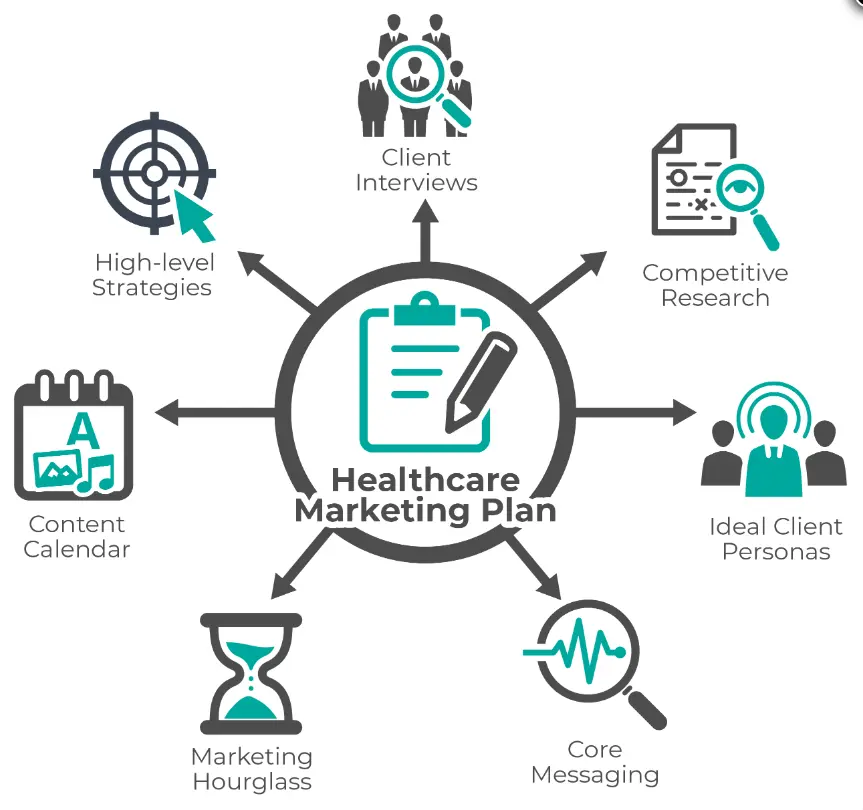
Identifying Target Audience
Understanding your target audience is essential for crafting a successful healthcare marketing plan. This involves knowing who you want to reach with your messages - whether it's older adults, new moms, patients with specific health conditions, or any other demographic.
By understanding your target audience, you can tailor your healthcare marketing efforts to resonate with their needs and preferences.
Suggested Reading:Top Healthcare Marketing Tools for 2024
Clear Goals and Objectives
Setting clear goals and objectives is vital for a successful healthcare marketing plan. You need to decide what you want to achieve with your marketing efforts - whether it's increasing appointment bookings, raising awareness about a new service, or educating people about a particular health issue.
By having clear goals in place, you can measure the effectiveness of your healthcare marketing activities and track your progress towards achieving them.
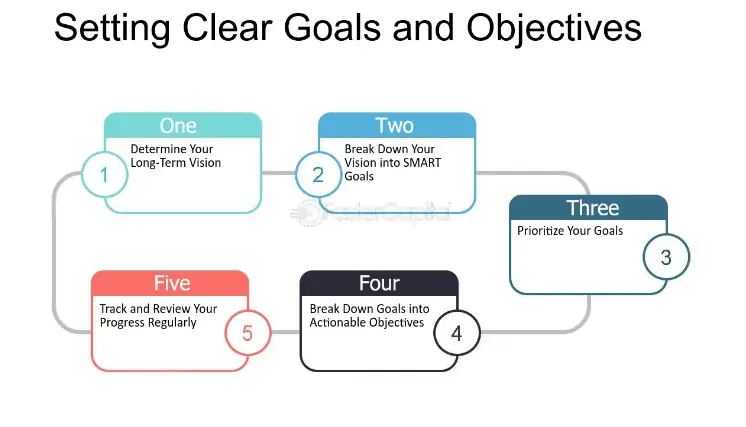
Conducting a SWOT Analysis
Conducting a SWOT analysis allows you to assess the Strengths, Weaknesses, Opportunities, and Threats facing your healthcare organization. By identifying these factors, you can better understand what your organization does well, where it can improve, what opportunities exist in the market, and what challenges you may face. This information is crucial for developing a healthcare marketing plan that capitalizes on your strengths and addresses your weaknesses.
Defining Key Performance Indicators (KPIs)
Defining key performance indicators (KPIs) is essential for tracking the success of your healthcare marketing plan. KPIs are like signposts that indicate whether your marketing efforts are on the right track.
They could include metrics such as website visits, appointment bookings, patient satisfaction ratings, or any other relevant data points. By setting clear KPIs, you can monitor the effectiveness of your marketing activities and make adjustments as needed to ensure you're meeting your goals.
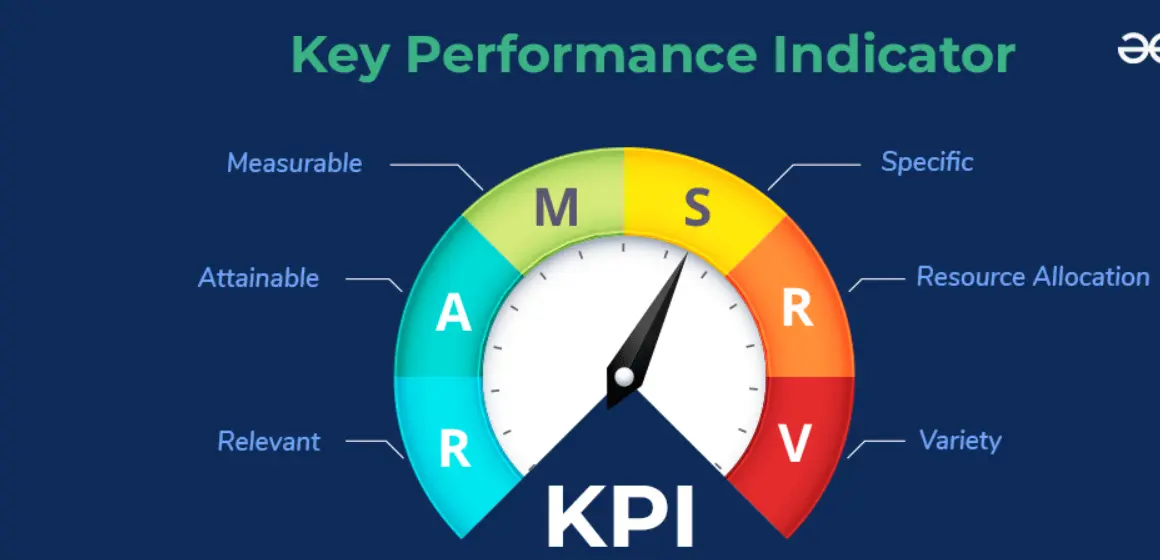
Key Strategies of Healthcare Marketing
Let's get through the key healthcare marketing strategies:
Importance of a Strong Online Presence
In healthcare marketing, having a strong online presence is crucial. It allows you to reach a larger audience and connect with potential patients more effectively.
A well-optimized website and active social media presence can help establish credibility and attract new patients.
Building and Optimizing a Website
Your website is often the first point of contact for patients looking for healthcare services. It should be visually appealing, easy to navigate, and filled with relevant information.
Make sure to include clear calls-to-action and contact information to encourage patient engagement. Include clear information about your services, contact details, and a healthcare chatbot to assist visitors.
Utilizing Social Media Platforms
Social media platforms are a powerful tool for reaching and engaging with patients. Create profiles on popular platforms like Facebook, Instagram, and Twitter to share updates, promote services, and interact with your audience.
Regular posting and engagement can help build relationships and drive traffic to your website. Share health tips, and updates about your services, and engage with your audience. Social media helps you reach a wider audience and build a community.
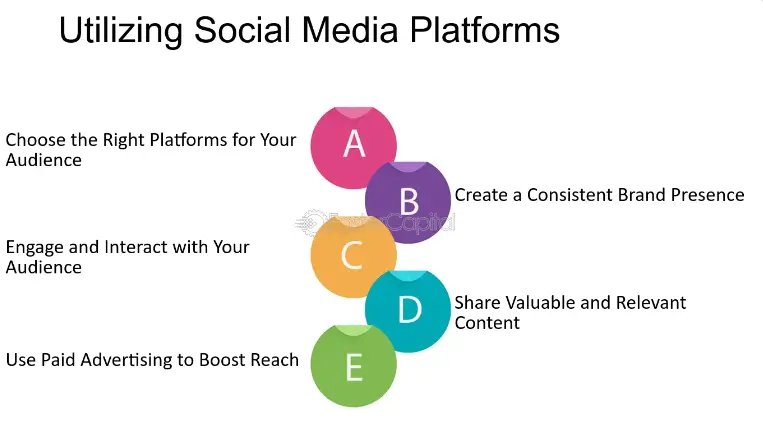
Email Marketing Best Practices
Email marketing is an effective way to stay in touch with patients and keep them informed about your services.
Use personalized and engaging content in your emails to grab attention and encourage action. Make sure to comply with privacy regulations and give patients the option to unsubscribe if they choose.
Search Engine Optimization (SEO) and Content Marketing
SEO and content marketing are essential for improving your website's visibility on search engines. Use relevant keywords, meta tags, and high-quality content to boost your website's ranking in search results. Regularly updating your content and optimizing it for search engines can help attract more organic traffic.
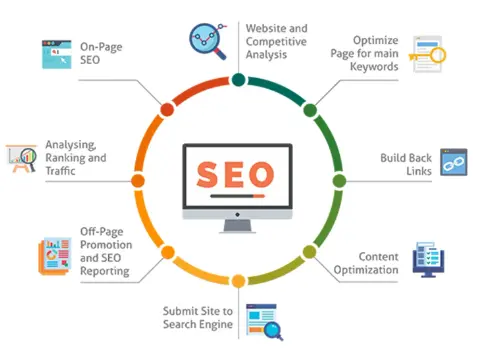
Key Traditional Marketing Strategies
Let's get through the traditional healthcare marketing strategies.
Print Advertising
Print advertising remains a powerful tool in healthcare marketing. By placing ads in newspapers, magazines, or local publications, healthcare providers can reach a broad audience.
These ads can showcase services, promote events, or share important information about the practice. Utilizing eye-catching visuals and concise messaging is key to capturing the reader's attention and driving engagement.
Direct Mail Campaigns
Direct mail campaigns involve sending physical mail pieces, such as postcards, flyers, or brochures, to targeted audiences. This method allows healthcare providers to personalize their messaging and reach specific demographics.
Sending out newsletters, appointment reminders, or special offers via direct mail can help retain patients and attract new ones. It is important to track the effectiveness of direct mail campaigns through response rates and conversions.
Networking and Events
Networking and attending events play a crucial role in healthcare marketing. By participating in relevant conferences, trade shows, or community events, healthcare professionals can connect with colleagues, patients, and other industry stakeholders. Building relationships through face-to-face interactions can lead to referrals and partnerships. Additionally, hosting educational seminars or health fairs can position the practice as a trusted source of information and expertise in the community.
Community Outreach Programs
Community outreach programs are instrumental in establishing a positive presence in the local area. Healthcare providers can sponsor local events, participate in charity initiatives, or offer free health screenings to give back to the community.
By engaging with community members and demonstrating a commitment to public health, healthcare practices can enhance their reputation and attract new patients. Collaborating with schools, businesses, or civic organizations can also create opportunities for community involvement and awareness.
Patient Engagement and Retention in Healthcare Marketing
Patient engagement and retention play a crucial role in the success of healthcare marketing. By actively involving patients in their own healthcare journey, healthcare providers can build stronger relationships, improve patient satisfaction, and ultimately drive better health outcomes.
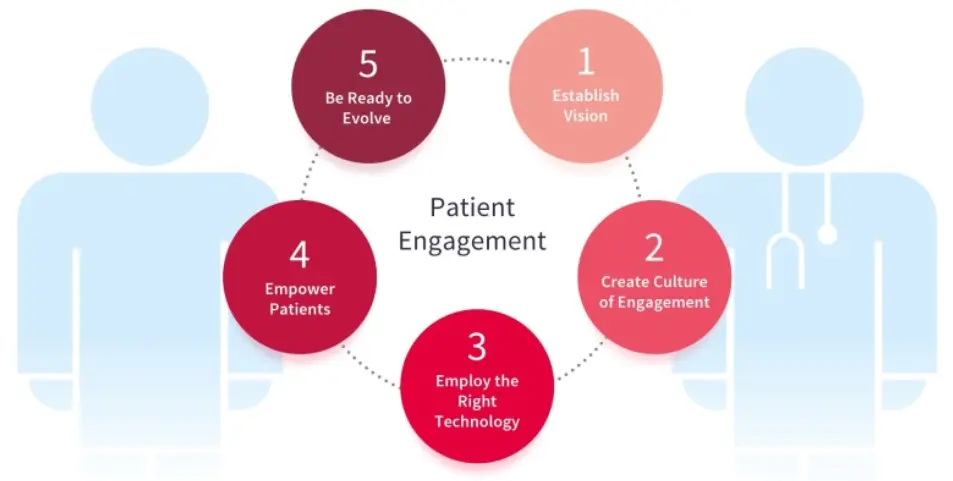
Building Trust and Credibility
In healthcare marketing, building trust and credibility is crucial. Patients want to feel confident in the healthcare providers they choose. By establishing trust, you can create long-lasting relationships with patients.
Providing Valuable Content and Resources
Providing valuable content and resources is essential in healthcare marketing. Patients are seeking reliable information to help them make informed decisions about their healthcare. By offering educational resources and valuable content, you can position yourself as a trusted source of information.
Encouraging Patient Reviews and Testimonials
Encouraging patient reviews and testimonials can significantly impact your healthcare marketing efforts. Positive reviews and testimonials showcase the quality of care you provide and can influence potential patients' decisions. By actively seeking and promoting reviews, you can enhance your reputation and attract new patients.
Implementing a Patient Referral Program
Implementing a patient referral program is a powerful way to grow your patient base. Satisfied patients are likely to refer their friends and family to your practice if they have had a positive experience.
Offering incentives for patient referrals can further encourage your current patients to spread the word about your services. Referral programs can be an effective way to attract new patients and increase your practice's visibility in the community.
Measuring Success and ROI in Healthcare Marketing
In healthcare marketing, measuring success is crucial to understand the impact of our efforts. But how do we know if our marketing strategies are working? The answer lies in evaluating return on investment (ROI).
Key Performance Indicators for Healthcare Marketing
To measure success in healthcare marketing, focus on these key performance indicators (KPIs):
Number of new patient appointments
Website traffic and engagement
Social media likes, shares, and comments
Patient satisfaction scores
Conversion rates from marketing campaigns
Analyzing Data and Metrics to Evaluate Campaign Effectiveness
Analyzing data helps understand how well your campaigns are performing:
Use Google Analytics to track website visitors and behavior.
Monitor social media insights to see which posts perform best.
Check email marketing stats like open rates and click-through rates.
Collect patient feedback to gauge satisfaction and areas for improvement.
Case Studies and Examples
Success stories are essential for learning and improving strategies. Let's dive into some successful healthcare marketing campaigns to gain valuable insights.
Case Study 1:
Mayo Clinic's Personalized Patient-Centric Approach
Mayo Clinic, a renowned healthcare institution, has been leading the way in personalized and patient-centric marketing.
By using data analytics and innovative technologies, Mayo Clinic has been able to tailor their marketing messages to individual patients, ensuring a more personalized experience.
Key Takeaway: Personalization is key in healthcare marketing. By understanding the needs and preferences of each patient, healthcare organizations can create targeted campaigns that resonate with their audience.
Case Study 2:
Ada Health's Chatbot for Healthcare
Ada Health, a digital health company, has successfully implemented a chatbot for healthcare that provides personalized medical advice to users.
Through the use of artificial intelligence and machine learning, Ada Health is able to offer real-time support and guidance to patients.
Key Takeaway: Chatbots in healthcare are revolutionizing the way patients access information and receive care. By leveraging technology, healthcare organizations can enhance the patient experience and improve overall satisfaction.
Future Trends in Healthcare Marketing
Staying current with emerging technologies and innovations is crucial. These advancements are revolutionizing the way healthcare organizations engage with patients and market their services.
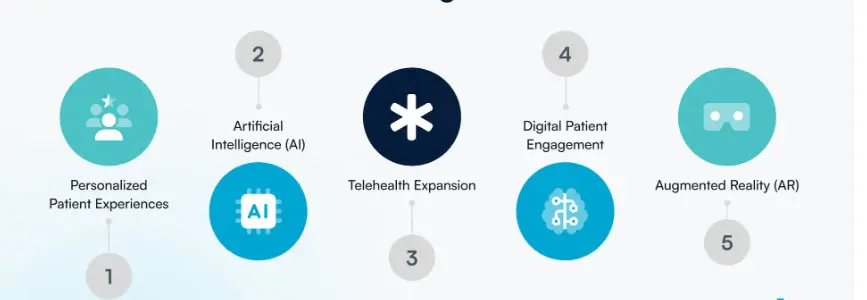
Emerging Technologies and Innovations
Technology is revolutionizing marketing in healthcare. Chatbots in healthcare are becoming more common, providing 24/7 support and information to patients.
Virtual reality (VR) and augmented reality (AR) are also being used for patient education and training. According to recent studies, 68% of healthcare organizations plan to adopt these technologies in the next five years.
Personalization and Patient-Centric Marketing
Personalization is the future of marketing for healthcare. Tailoring messages and content to individual patient needs increases engagement and satisfaction. Patient-centric marketing focuses on building relationships and providing value at every touchpoint.
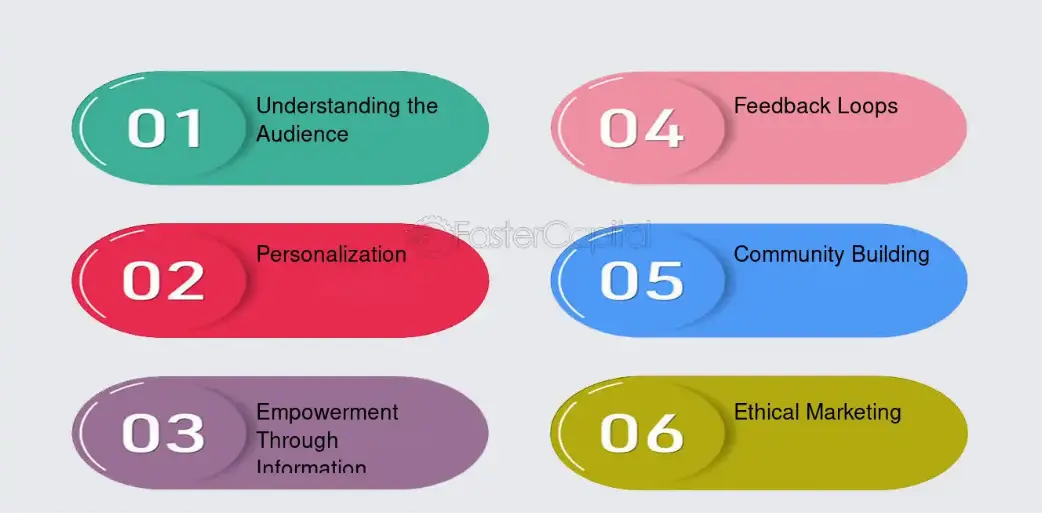
The Role of Telemedicine and Digital Health Tools
Telemedicine and digital health tools are growing rapidly. These tools make healthcare more accessible and convenient. Marketing strategies need to highlight the benefits of telemedicine, such as ease of access and time savings.
Promoting digital health tools can attract tech-savvy patients and improve overall care delivery. Statistics show that telemedicine usage increased by 154% during the early months of the COVID-19 pandemic and continues to rise.
Conclusion
In conclusion, marketing in healthcare has evolved significantly, embracing digital innovations to meet the changing needs of patients and providers alike. As we've explored in this guide, effective marketing for healthcare goes beyond traditional methods, incorporating cutting-edge technologies and strategies to engage and inform audiences.
One of the most promising developments in healthcare marketing is the rise of healthcare chatbots. These AI-powered assistants are transforming patient interactions, providing instant support, and streamlining operations. Platforms like BotPenguin offer customizable chatbots for healthcare, enabling providers to enhance their marketing efforts and improve patient experiences.
As the healthcare landscape continues to evolve, marketers must stay agile and informed. By leveraging the strategies outlined in this guide and embracing innovations like chatbots, healthcare organizations can build stronger connections with their communities, improve patient outcomes, and thrive!
Remember, successful healthcare marketing is not just about promoting services—it's about creating meaningful, lasting relationships with the people you serve.
Frequently Asked Questions(FAQs)
What is healthcare marketing?
Healthcare marketing involves promoting healthcare services, facilities, and providers to attract and retain patients. It includes strategies like online presence, content marketing, social media, and patient engagement to improve brand visibility and patient trust.
Why is healthcare marketing important?
Healthcare marketing is vital for attracting new patients, retaining existing ones, and building trust. It enhances patient engagement, improves communication, and helps healthcare providers stay competitive by showcasing their expertise and services.
How can I create a successful healthcare marketing strategy?
Identify your target audience, set clear goals, choose appropriate marketing channels, and allocate a budget. Use a mix of online and offline tactics, focus on patient education, and regularly measure and adjust your strategies for optimal results.
What role does social media play in healthcare marketing?
Social media helps healthcare providers engage with patients, share valuable health information, and build a community. It increases visibility, fosters trust, and allows for real-time communication and feedback from patients.
How can content marketing benefit healthcare providers?
Content marketing educates patients, builds trust, and positions providers as experts. By creating valuable content like blogs, videos, and infographics, healthcare providers can engage patients, improve SEO, and attract more visitors to their websites.
How important are patient reviews in healthcare marketing?
Patient reviews are crucial for building trust and credibility. Positive reviews attract new patients, while addressing negative reviews shows commitment to patient satisfaction. Encourage satisfied patients to leave reviews and manage your online reputation proactively.

